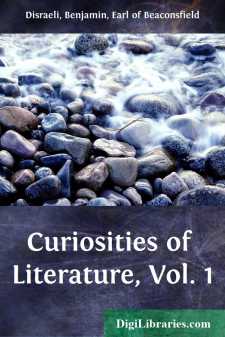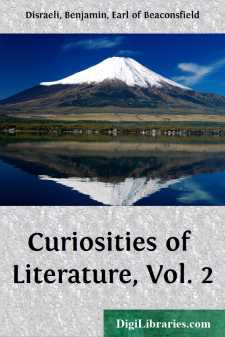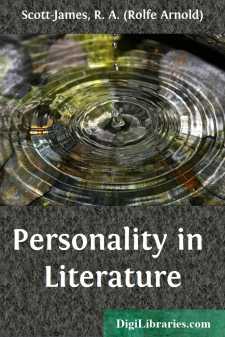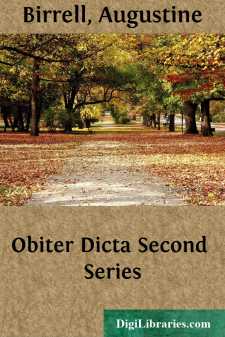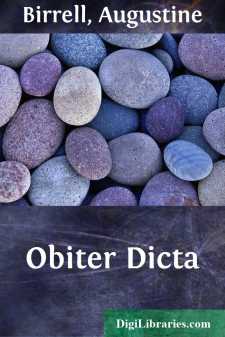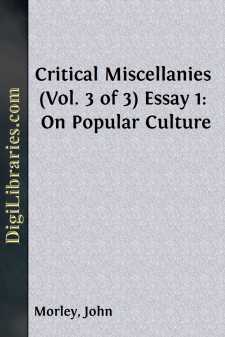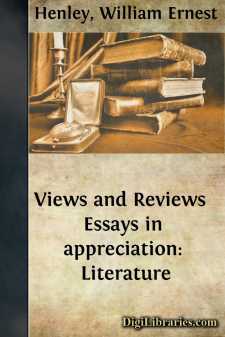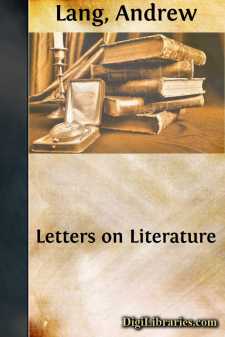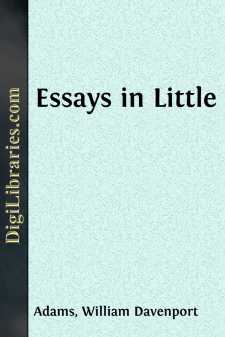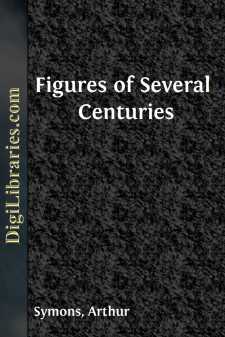Literary Criticism
- American 18
- Ancient and Classical 3
- Asian 1
- Australian & Oceanian 1
- Books & Reading 8
- Caribbean & Latin American 2
- Drama 2
- English, Irish, Scottish, Welsh 49
- European 7
- General 37
- Horror 1
- Humor 2
- Jewish 2
- Medieval 2
- Middle Eastern 3
- Poetry 7
- Renaissance 6
- Russian & Former Soviet Union 1
- Shakespeare 27
Literary Criticism Books
Sort by:
ON THE LIFE AND WRITINGS OF MR. DISRAELI. BY HIS SON. The traditionary notion that the life of a man of letters is necessarily deficient in incident, appears to have originated in a misconception of the essential nature of human action. The life of every man is full of incidents, but the incidents are insignificant, because they do not affect his species; and in general the importance of every...
more...
CHARLES THE FIRST. Of his romantic excursion into Spain for the Infanta, many curious particulars are scattered amongst foreign writers, which display the superstitious prejudices which prevailed on this occasion, and, perhaps, develope the mysterious politics of the courts of Spain and Rome. Cardinal Gaetano, who had long been nuncio in Spain, observes, that the people, accustomed to revere the...
more...
THE DEGRADATION OF BEAUTY Some time ago I found myself at an exhibition of Post-Impressionist pictures, under the ægis of an artist who was himself of that persuasion. Indeed, he was one of the exhibitors, and I was constrained to express my opinions in the form of questions. We passed before a picture which to my untutored eyes was formless, meaningless and ugly. It was by a well-known artist, and my...
more...
I am sorry not to have been able to persuade my old friend, George Radford, who wrote the paper on ‘Falstaff’ in the former volume, to contribute anything to the second series of Obiter Dicta. In order to enjoy the pleasure of reading your own books over and over again, it is essential that they should be written either wholly or in part by somebody else. Critics will probably be found ready to...
more...
CARLYLE The accomplishments of our race have of late become so varied, that it is often no easy task to assign him whom we would judge to his proper station among men; and yet, until this has been done, the guns of our criticism cannot be accurately levelled, and as a consequence the greater part of our fire must remain futile. He, for example, who would essay to take account of Mr. Gladstone, must...
more...
by:
John Morley
The proceedings which have now been brought satisfactorily to an end are of a kind which nobody who has sensibility as well as sense can take a part in without some emotion. An illustrious French philosopher who happened to be an examiner of candidates for admission to the Polytechnic School, once confessed that, when a youth came before him eager to do his best, competently taught, and of an apt...
more...
DICKENS A ‘Frightful Minus’ Mr. Andrew Lang is delightfully severe on those who ‘cannot read Dickens,’ but in truth it is only by accident that he is not himself of that unhappy persuasion. For Dickens the humourist he has a most uncompromising enthusiasm; for Dickens the artist in drama and romance he has as little sympathy as the most practical. Of the prose of David Copperfield and Our...
more...
by:
Andrew Lang
INTRODUCTORY: OF MODERN ENGLISH POETRY To Mr. Arthur Wincott, Topeka, Kansas. Dear Wincott,—You write to me, from your “bright home in the setting sun,” with the flattering information that you have read my poor “Letters to Dead Authors.” You are kind enough to say that you wish I would write some “Letters to Living Authors;” but that, I fear, is out of the question,—for me. A...
more...
ALEXANDRE DUMAS Alexandre Dumas is a writer, and his life is a topic, of which his devotees never weary. Indeed, one lifetime is not long enough wherein to tire of them. The long days and years of Hilpa and Shalum, in Addison—the antediluvian age, when a picnic lasted for half a century and a courtship for two hundred years, might have sufficed for an exhaustive study of Dumas. No such study...
more...
by:
Arthur Symons
SAINT AUGUSTINE The Confessions of St. Augustine are the first autobiography, and they have this to distinguish them from all other autobiographies, that they are addressed directly to God. Rousseau's unburdening of himself is the last, most effectual manifestation of that nervous, defiant consciousness of other people which haunted him all his life. He felt that all the men and women whom he...
more...


